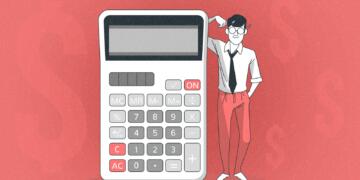The college experience sometimes involves living on the edge with an academic workload, late-night studies, fitting in, and unstable finances. Acquiring a positive financial health status means juggling expensive tuition fees and a lack of a sustainable income.
Personal finance management is a life skill college students must develop to cope with the surmounting pressures. The first few steps in taking responsibility for your finances can be hit-and-miss. However, they are integral in setting you up for a healthy financial future.
Budgeting apps are gaining much traction due to their simplicity in tracking expenses. It might seem like a foreign language, but getting through thick times is a prerequisite. A quick sign-up on these apps can track your expenditures and develop healthy financial habits.
Moreover, these apps contain numerous functionalities, from expense categorization, translate pdf to English online functions, goal setting, push notifications, and financial reports. Know what you’re spending more money on and how to cut back.
Why Is Budgeting Essential?
Student loan debt has increased over 66% over the past decade, with over 43 million students with outstanding federal loan debt. The high number of debts borrowed calls for students to invest heavily in their budgeting techniques.
A budget provides a spending cap to ensure you maintain a positive financial status. College life contains various expenses such as tuition, transportation, textbooks, fees, meal plans, living expenses, personal expenses, and extracurricular activities, among many more. Here’s what stands out about maintaining straightforward budgeting criteria:
Avoid Unnecessary Expenditure
Part of personal financial management involves separating your needs from wants. Some expenses under the needs section include tuition, textbooks, room and board, and food. Other expenses under the wants section include attending events, getting new tech gear, or going on dates. Establishing a clear line between the two means you can focus more on achieving your needs.
Acquire Valuable Life Skills
Budgeting teaches one about financial stability. You learn to track your finances and have options to maneuver through tricky financial situations or emergencies. Moreover, you can pay your bills on time, save for future expenses, and create an emergency fund. These are vital steps towards attaining your financial freedom after graduating.
Maintain Financial Health
Most adults struggle with past student loans that affect their financial freedom. Tracking your expenses early during college breeds a culture of saving and controlling expenses. Consistently budgeting influences better financial decisions. It means avoiding unwanted debt while focusing on achieving long-term monetary goals.
How to Get Started With Budgeting in 2024
It seems a fairytale getting your finances in check. But, it starts with the first small steps and graduates into big financial decisions. Here is a simple procedure to kick-start your new journey:
Formulate a Budget Spreadsheet
Good record keeping and documentation is the first step towards starting your budgeting journey. Therefore, formulate a spreadsheet for your spending that creates visualized content about where funds should go and what to reduce. Most budgeting tools contain ready-made templates to fill out.
Determine Net Income
In your case, net income involves all sources of financial support received. It can range from scholarships, allowances, Federal work-study, or financial aid. Moreover, you can have a side hustle or part-time job to chip in. Tailor-make your budget to reflect your income’s frequency.
Prioritize Expenses
Afterward, create a listicle containing all your monthly expenses. This includes recurrent expenditures such as transport, rent, groceries, school supplies, or loan payments. Afterward, estimate the cost of each expense to calculate the average monthly expenses.
Compare Income vs. Expenses
Lastly, calculate your net income and average monthly expenditure to determine whether you live within your means. A positive number means you’re financially healthy. However, a negative number means you need these budgeting apps.
Top-Rated Options Available in the Market
A budgeting app can help grow your money management skills while keeping you accountable and organized.
Mint
Mint is an innovative app that provides a bird’s-eye view of your finances. Users can easily link the app to their banking accounts and debit/credit cards for automatic updates on their expenditures. We recommend it as a daily expense tracker and bill planner. Furthermore, you can receive notifications and reminders of pending bills. There are customized budget templates that categorize transactions. Adjust your budget to align with your financial goals.
Squirrel
Another exciting budgeting app available for Apple and Android users is Squirrel. The app allows for easy money management while viewing all your investment accounts anytime. Set your financial goals as a “bucket”‘ as part of your savings pot. Moreover, itemize your goals while sharing them with friends or family for collective responsibility to attain your budgeting goals.
Wally
This free AI-powered personal finance app keeps all your finances in one place. It is fully automated, connects all your accounts, and tracks all your spending, cash flow, pending bills, and budget goals. Its AI-powered capabilities provide an active chatbot to speak directly about your finances. Moreover, you can easily plan and set goals while learning more finance options. Additionally, it is available to over 15,000 banks across 70 countries.
Splitwise
Some students with better financial positioning might have higher expenditures than their fellow students. Hence, they need an all-in-one app that keeps track of shared expenses and balances with friends, family, or fellow students. The intuitive mobile app features numerous functionalities, including tracking balances, organizing expenses, adding extra expenses, or checking on pending bills. Moreover, it organizes your finances with receipt scanning, conversion rates, charts, and graphs for detailed tracking.
EveryDollar
Students with limited financial muscle to try out premium apps can try out the free but effective EveryDollar app. Users can easily create a customized budget within ten minutes. New signees to the app can easily set up their account and create a budget. The user-friendly app uses a zero-based budgeting approach, ensuring the difference between income and expenditure equals zero.
Final Thoughts
Success with your finances lies in how you handle and account for expenses. Looking closely at your finances leads to easy money management. Fortunately, multiple apps are available to incorporate into your financial budgeting. Try these apps to help you achieve your financial goals without overspending.



























